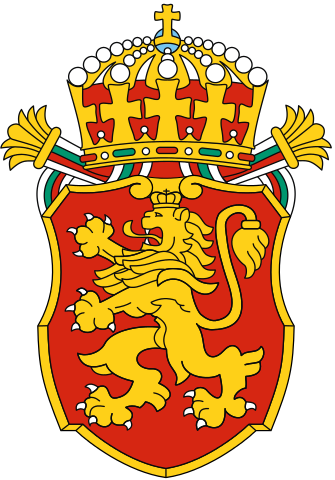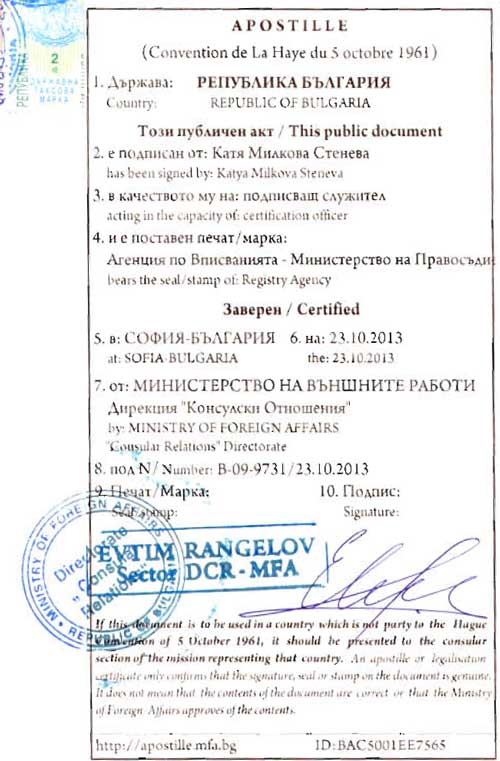
Schmidt & Schmidt компаниясы Болгария Республикасында берілген құжаттарды апостиль арқылы заңдастыру қызметін ұсынады.
Болгария 1961 жылғы 5 қазандағы Гаага конвенциясының мүшесі болып табылады, ол құжаттарды апостиль арқылы жеңілдетілген түрде заңдастыру рәсімін қарастырады. Болгария Республикасы құжаттарды жеңілдетілген заңдастыруға арналған Гаага конвенциясына 2000 жылғы 1 тамызда қосылды, ал 2001 жылғы 29 сәуірде конвенция оның аумағында күшіне енді.
Болгарияда апостиль қою функциясы бірден бірнеше қызмет пен ведомствоға жүктелген. Сот актілері мен нотариалды құжаттарды куәландыруға уәкілетті орган – Болгарияның Әділет министрлігі. Азаматтық жағдайға қатысты құжаттар, тіркеу құжаттары, сертификаттар, лицензиялар және басқа да мемлекеттік актілерді куәландыруға Болгарияның Сыртқы істер министрлігі жауапты. Мектепке дейінгі, орта және жоғары білім құжаттарына апостиль 2013 жылдан бастап Білім министрлігінің уәкілетті бөлімшелерінде қойылады. 2017 жылғы 1 қаңтардан бастап білім туралы құжаттарды Болгарияның Ұлттық ақпарат және құжаттама орталығы да апостильмен куәландырады.
Болгарияда берілген, апостильмен расталған және нотариалды аударылған құжаттар Қазақстанда заңды күшке ие.
Болгариядағы құжаттарды заңдастыру процесі құжаттың шығу тегін тексеруді қамтиды және құжаттағы қолтаңба, мөр немесе штамп уәкілетті тұлғалармен қойылғанын растайды. Осы рәсімнен кейін құжатқа арнайы мөр – апостиль қойылады. Апостиль әдетте құжаттың артына немесе бөлек бетке қойылады, кейін құжат тігіледі.
Болгария Республикасындағы апостиль – төртбұрышты мөр, қырының ұзындығы кемінде 9 сантиметр, болгар және ағылшын тілдерінде жасалады, міндетті «Apostille» тақырыбын және 1961 жылғы Гаага конвенциясына француз тілінде сілтемені қамтиды (Convention de La Haye du 5 octobre 1961). Мөрдің мазмұны Гаага конвенциясында көрсетілген.

Болгарияда апостиль арқылы куәландырылуы мүмкін құжаттар
- Мемлекеттік мекемелер, өзін-өзі басқару органдары және лауазымды тұлғалар, оның ішінде прокурорлар, судьялар және сот орындаушылары берген құжаттар
- Болгарияның сауда реестрінен үзінділер
- Әкімшілік құжаттар
- Нотариалды актілер
- Жеке тұлғалар қол қойған ресми құжаттардың куәландырылған көшірмелері
- Ресми құжаттардың нотариалды көшірмелері
Кедендік, дипломатиялық, консулдық құжаттар мен төлқұжаттарға апостиль қолданылмайды. Апостильдің жарамдылық мерзімі шектелмеген, бірақ құжаттардың жарамдылық мерзіміне шектеулер қойылуы мүмкін.
Апостиль мен консулдық заңдастыру арасындағы айырмашылықтар
Апостиль мен консулдық заңдастырудың ортақ белгісі – олар ресми құжаттың басқа елдің мекемелерінде қолданылуы үшін шынайылығын растайды. Алайда олардың арасында елеулі айырмашылықтар бар.
| Апостиль | Консулдық заңдастыру | |
|---|---|---|
| Шындық | Тек Гаага конвенциясына қатысушы елдер арасында ғана қолданылуы мүмкін. | Гаага конвенциясына қатыспайтын немесе қатысушы еместігінен бір немесе екі ел арасында, немесе бір тарап екінші тараптың қосылуына қарсы болған жағдайда қолданылады. |
| Алу қиындығы | Орташа. Апостиль алу үшін құжат берілген елдің уәкілетті органыға жүгіну қажет. | Жоғары. Консулдық заңдастыру үшін құжат берілген елдің әртүрлі органдарына және консулдықтарға жүгіну қажет |
| Алдын ала растау | Қажет емес. | Қажет. Құжатты берген органнан алдын ала растау қажет. |
| Мақсат елінің консулдығында заңдастыру | Мақсат елінің консулдығына жүгіну қажет емес. | Заңдастырудың соңғы кезеңі әдетте құжат берілген елде мақсат елінің консулдығында өтеді. |
Болгарияда құжаттарды алу
Көбінесе азаматтық жағдайға қатысты құжаттар жоғалып кетеді немесе зақымданады, немесе құжаттардың өзекті көшірмелерін алу қажет болады. Бұл жағдайда құжаттардың дубликаттарын алу қажет. Көбінесе бұл процедурада қиындыққа тап болатындар – Болгариядан кеткен адамдар. Біздің сервис Болгариядағы құжаттарды қашықтықтан алуға мүмкіндік береді және құжатты әлемнің кез келген нүктесіне курьер арқылы жеткізе алады.
Құжаттардың нотариалды аудармасы
Көбінесе мемлекеттік органдар тек мемлекеттік тілде жасалған құжаттарды қабылдайды. Сондықтан шетелдік құжаттарды мақсатына пайдалану үшін, апостильмен расталған және шетел тілінде жасалған құжаттарды аудару қажет, сонымен қатар аударма нотариалды түрде куәландырылуы тиіс. Біздің қызмет арқылы құжаттарды қазақ немесе орыс тіліне нотариалды аударуға тапсырыс бере аласыз.
Аударма апостильмен куәландырылуы керек пе?
Бір елде берілген және басқа елде қолдану қажет кез келген шетелдік құжат заңдастырылуы тиіс. Болгарияда жасалған және апостиль қойылған құжаттың аудармасы қажет тілге аударылған жағдайда да, ол шетелдік құжат мәртебесін сақтайды, яғни оған апостиль қою қажет болады. Сондықтан көптеген органдар Болгариядан жасалған куәландырылған аудармаларды қабылдамауы мүмкін. Бұл мәселені болдырмау үшін аударманы құжатты қолданатын елде жасау ұсынылады.
























































